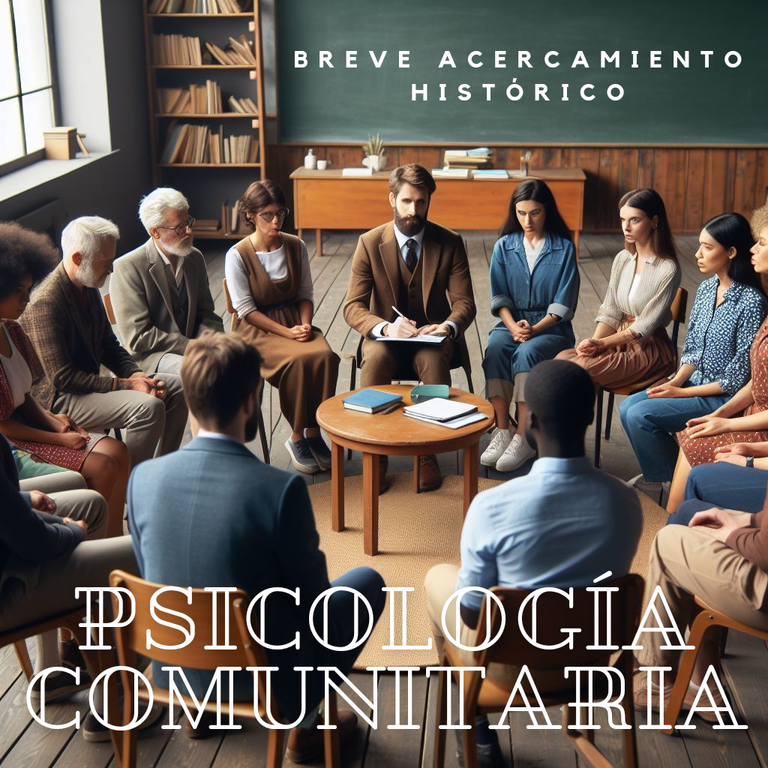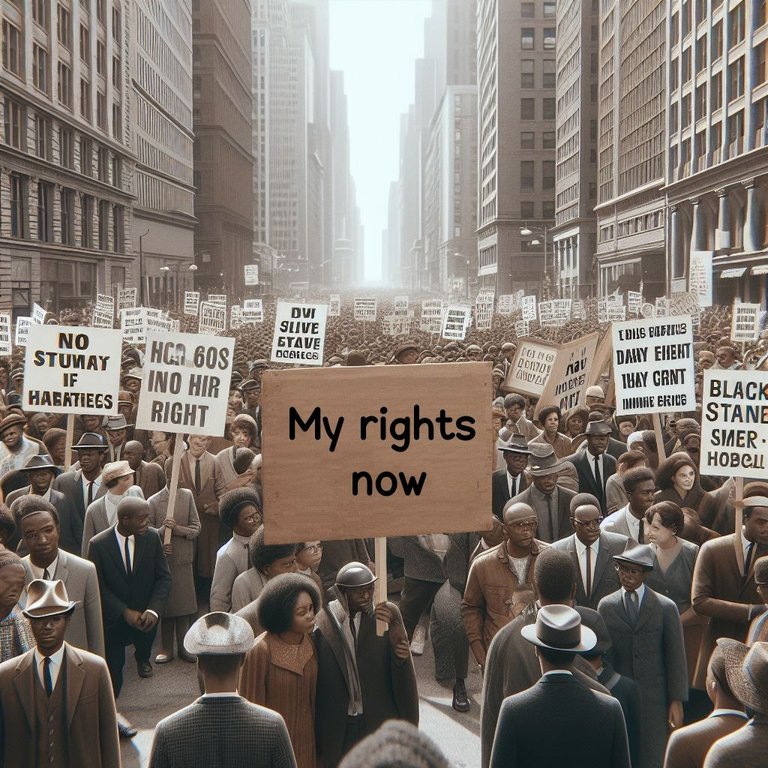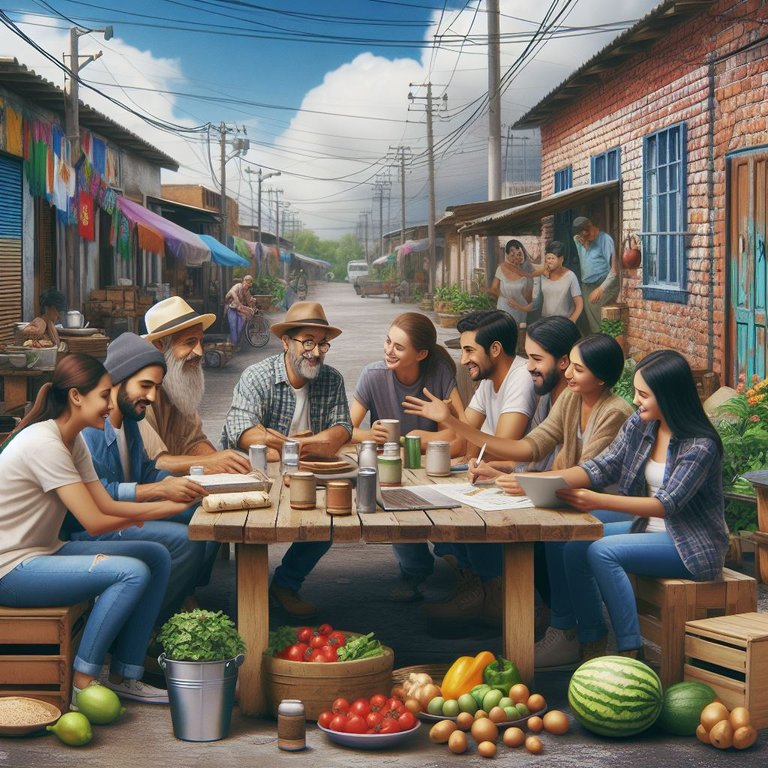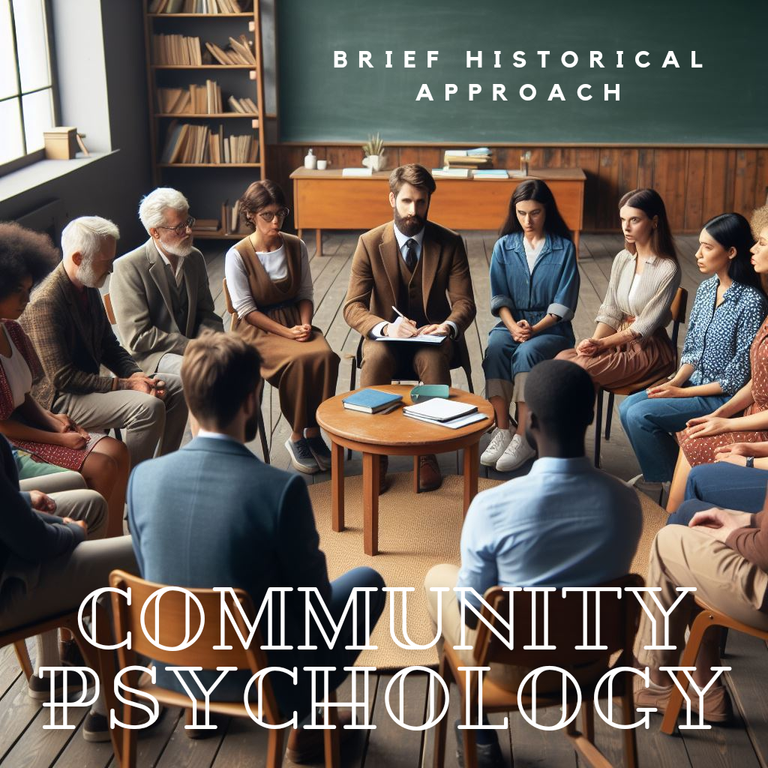Un breve acercamiento histórico a la Psicología Comunitaria | A brief historical approach to community psychology [ES/EN]

Hola comunidad. Hoy quiero hacer un poco de historia para hablarles de la Psicología Comunitaria como rama de esta disciplina que se enfoca obviamente en las comunidades viéndolas no solo como un grupo más, sino también que toma en cuenta el matiz de cada una según el contexto en que funcionan. Normalmente suele estar solapada con la Psicología Social y aparentemente es poco el conocimiento que se tiene de ella y sin embargo ha jugado un papel importante en las luchas de las diferentes minorías sociales por sus derechos.
Con la aparición de la Psicología Comunitaria culmina una etapa de búsqueda y comienza un proceso revolucionador donde se han sucedido cambios notables en la atención de Salud Mental (Ramiro, 2002, p. 1).
La Psicología Comunitaria es un ámbito de aplicación de la Psicología que estudia las comunidades a partir de la influencia de factores psicosociales, con el fin último de emprender acciones encaminadas al mejoramiento de las condiciones en que se desenvuelven sus pobladores y fortalecer a dicha comunidad. ¿Dónde y cuándo surge?, pues en los Estados Unidos en los años 60, precedida por importantes movimientos que cuestionaban las formas tradicionales de operar de las Ciencias Sociales y criticaban el enfoque individualista que existía que no llegaba a satisfacer las necesidades de las personas en un mundo en constante cambio social, científico o técnico.
Dichos movimientos pueden ser los movimientos tercermundistas en Latinoamérica que buscaban intervenciones en las comunidades, la Psicología Social, el Construccionismo Social, el movimiento de la antipsiquiatría en Italia, el proceso de sectorización en Francia, entre otros. En esta década, se daba en los Estados Unidos, distintas manifestaciones de activismo social, que fomentaban los derechos cívicos, la ideología separatista de los negros, la lucha contra la pobreza y las demostraciones de los estudiantes universitarios, entre otros, que propiciaron que los psicólogos salieran a las calles a buscar la eficiencia de las profesiones de asistencia a favor del cambio social.

Además de los objetivos con que nace, la Psicología Comunitaria de desindividualizar la atención y cambiar el rígido marco de las tendencias anteriores, también lo hace para servir de mediatizadora a conflictos sociales y brindar atención a los sectores de población de Estados Unidos, que eran diferentes del resto de la población debido a su etnia, religión, cultura o posición social. Se partía de que debido a esas diferencias es que existían los desajustes emocionales, y, por tanto, respetando a diferencias culturales, lograr su ajuste efectivo a partir de la intervención social y sabiendo que estas personas no pueden recibir pasivamente las soluciones, sino que tienen que tornarse activos mediante la modificación de los servicios, la familia, iglesia, escuela, centro laboral, etc., sin cambiar los recursos materiales.
Aquí es donde se le critica su enfoque clasista y discriminatorio que cuestiona su carácter científico, pero sin embargo tuvo muchos puntos fuertes como el análisis de factores sociales para la atención de la salud, tener un enfoque integral de la enfermedad, eliminar el enfoque individualista, atender al papel activo de las personas y dirigirse hacia la prevención de las enfermedades principalmente.
Llega a América Latina como alternativa idónea para enfrentar los conflictos sociales e individuales y no toma a los psicólogos como agentes de mediatización social, sino que estos se limitan a ser coordinadores mientras que el papel principal lo toman, sí, precisamente las comunidades de manera activa en pos de su empoderamiento sin desatender la importancia del vínculo con la gobernanza. En este sentido se puede decir que las llamadas políticas públicas tienen o deberían tener este enfoque comunitario.

Cronológicamente se puede dividir en dos etapas: una en la que coexiste con las dictaduras militares que imponen una dura represión política, durante los años 60 y 70, y otra en la que se abren y democratizan los gobiernos con las políticas de salud de la OMS y OPS. En esta región se ha influido con más fuerza en ámbitos como la promoción de la salud, la posición de la mujer en la sociedad, sexualidad, educación de los hijos, posiciones rurales, etc.
En sentido general en cada país se ha trabajado según las posibilidades que han tenido los psicólogos, con poco apoyo gubernamental, utilizando diversas vas como: Las instituciones de salud, la va académica, los movimientos populares, los colectivos laborales, las comunidades eclesiásticas, etc. (Ramiro, 2002, p. 3)
Hasta aquí este breve acercamiento sobre la Psicología Comunitaria. Espero haber cumplido mi objetivo de traerles de manera lo más sintética posible el desarrollo histórico de esta disciplina, y que así pudiesen conocerla. Me parecía justo teniendo en cuenta lo mucho que le debemos las clases bajas desde el punto de vista de la salud. Sin más, ¡nos vemos en Hive!
English version

Hello community. Today I want to make a little history to talk about Community Psychology as a branch of this discipline that obviously focuses on communities seeing them not only as a group, but also taking into account the nuance of each one according to the context in which they operate. It is usually overlapped with Social Psychology and apparently there is little knowledge of it, yet it has played an important role in the struggles of different social minorities for their rights.
With the emergence of community psychology, a stage of research culminates and a revolutionary process begins in which notable changes have taken place in mental health care (Ramiro, 2002, p. 1).
Community Psychology is a field of application of Psychology that studies communities based on the influence of psychosocial factors, with the ultimate goal of undertaking actions aimed at improving the conditions in which its inhabitants develop and strengthening the community. Where and when did it emerge? Well, in the United States in the 1960s, preceded by important movements that questioned the traditional ways of operating the social sciences and criticized the individualistic approach that did not meet the needs of people in a world in constant social, scientific or technical change.
Such movements could be the Third World movements in Latin America that sought interventions in communities, Social Psychology, Social Constructionism, the anti-psychiatry movement in Italy, the sectorization process in France, among others. In this decade, different manifestations of social activism were taking place in the United States, promoting civic rights, black separatist ideology, the fight against poverty and demonstrations by university students, among others, which led psychologists to take to the streets to seek the efficiency of the assistance professions in favor of social change.

In addition to the objectives with which Community Psychology was born, to deindividualize attention and change the rigid framework of previous trends, it was also born to serve as a mediator of social conflicts and to provide attention to sectors of the U.S. population that were different from the rest of the population due to their ethnicity, religion, culture or social position. It was assumed that it was due to these differences that emotional maladjustments existed, and therefore, respecting cultural differences, to achieve their effective adjustment through social intervention and knowing that these people could not passively receive solutions, but had to become active through the modification of services, family, church, school, work center, etc., without changing the material resources.
This is where it is criticized for its classist and discriminatory approach that questions its scientific character, but nevertheless it had many strong points such as the analysis of social factors for health care, having an integral approach to the disease, eliminating the individualistic approach, attending to the active role of people and mainly focusing on the prevention of diseases.
It arrives in Latin America as a suitable alternative to face social and individual conflicts and does not take psychologists as agents of social mediatization, but rather they limit themselves to being coordinators while the main role is taken, yes, precisely by the communities in an active manner in pursuit of their empowerment without neglecting the importance of the link with governance. In this sense, it can be said that the so-called public policies have or should have this community approach.

Chronologically, it can be divided into two stages: one in which it coexists with military dictatorships that impose harsh political repression, during the 60s and 70s, and another in which governments are opened and democratized with the health policies of WHO and PAHO. In this region, health promotion, the position of women in society, sexuality, education of children, rural positions, etc., have been more strongly influenced in this region.
In a general sense, in each country, work has been done according to the possibilities that psychologists have had, with little governmental support, using various means such as: Health institutions, academic va, popular movements, labor collectives, ecclesiastical communities, etc. (Ramiro, 2002, p. 3).
So far this brief approach to Community Psychology. I hope I have fulfilled my objective of bringing you as synthetically as possible the historical development of this discipline, so that you could get to know it. It seemed only fair, considering how much we, the lower classes, owe it from a health point of view. Without further ado, see you at Hive!

Créditos | Credits
Referencias bibliográficas:
Ramiro S., Y. (2002). Psicología Comunitaria. Análisis histórico en Estados Unidos, América Latina y Cuba. La Habana.
Imágenes utilizadas | Images used:
Todas las imágenes son de mi propiedad y fueron generadas utilizando la IA de Bing Image Creator | All images are my own and were generated using Bing Image Creator's AI.
Traducción | Translation:
DeepL
Congratulations @genrigp! You have completed the following achievement on the Hive blockchain And have been rewarded with New badge(s)
Your next target is to reach 70 posts.
You can view your badges on your board and compare yourself to others in the Ranking
If you no longer want to receive notifications, reply to this comment with the word
STOPTo support your work, I also upvoted your post!
Check out our last posts:
Congratulations @genrigp! You received a personal badge!
Thank you for participating in the Leo challenge.
You can view your badges on your board and compare yourself to others in the Ranking
Check out our last posts: